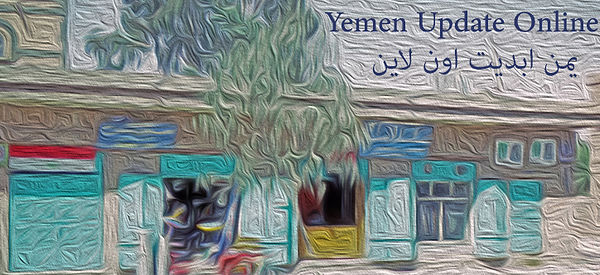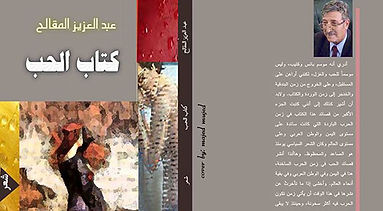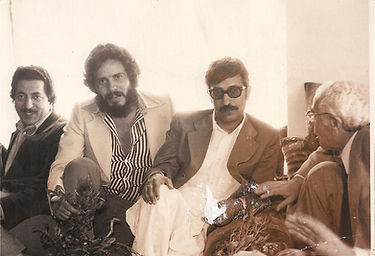
‘Abd al-‘Azīz al-Maqāliḥ:
A Biographical Portrait
by Samuel Liebhaber
Yemen Update 2020 #52-E1
It is no exaggeration to describe Dr. ʿAbd al-ʿAzīz al-Maqāliḥ (b. 1937 in al-Nādira, Governorate of Ibb) as the presiding genius of Yemen’s cultural and literary scene. Like Dr. ʿAbd al-ʿAzīz al-Maqāliḥ’s peers in the Arab world who share his artistry, social conscience, and unremitting creative energy, a single label cannot convey Dr. ʿAbd al-ʿAzīz al-Maqāliḥ’s importance to the intellectual life of modern Yemen. Dr. ʿAbd al-ʿAzīz is typically defined through his literary works as a poet, but this signifies much more in the Arab world than it does in a Euro-American context.
Accordingly, Dr. al-Maqāliḥ’s significance to his homeland mirrors that of his mentor, Muḥammad Maḥmūd al-Zubayrī, whose poetic craft was inseparable from his life’s work towards the political and social mobilization of the Yemeni public. It is no coincidence that Dr. al-Maqāliḥ’s emergence as a public intellectual occurred with the circulation of his doctoral thesis on al-Zubayrī, a seminal work that asserts the centrality of poetry in driving positive political and social change in Yemen. Yet Dr. al-Maqāliḥ’s poetic works surpass those of his mentor in number, scope, and embrace of novel aesthetic modes.
Like his near contemporary, the poet ʿAbdallāh Baraddūnī – the third member of Yemen’s modern poetic triumvirate – Dr. al-Maqāliḥ migrated thematically from al-Zubayrī’s oratorical solidity into the realm of Arab literary modernism with its narrative fragmentation, ominous undercurrents, and uncanny symbolism. Unlike al-Baraddūnī, Dr. al-Maqāliḥ heeded the modernist call for formal innovation, discovering in the looser metrical and rhyme schemes of free verse the means to express the dislocation and thwarted aspirations of the Yemeni and Arab people.
Dr. al-Maqāliḥ is rightly regarded as Yemen’s first modernist poet in form and content, an assertation buttressed by Dr. al-Maqāliḥ’s prodigious poetic output through published collections and individual poems published in print newspapers and digital forums. Dr. al-Maqāliḥ’s love for his country and its people is limned through his paeans and elegies to Sana’a, a city whose myths and tragedies imbue his poetry with their signature aura of contemplative melancholy:
Time burns quietly in the cellars of Sana’a,
Like the oil of ancient lanterns.
Qasidas give birth to dreams, opaque by choice,
to fear of the desert, to dust.
One young poet, not too long ago, crawled
to the foot of one of her swelling hills
and with translucent, shimmering dew on his lips
whispered:
“Do you love her?
They teased me, they laughed at me,
but I clung to her more tightly.
Her hair is matted with the passage of time
into dusty knots of history.
Who among you can’t find your childhood in her?
It is Sana’a who transfixes you,
even if you don’t realize it!”
(ʿAbd al-ʿAzīz al-Maqāliḥ, The Book of Sana’a, trans. Bob Holman and Sam Liebhaber, Ardmore: American Institute for Yemeni Studies, 2004, p. 217).
And yet Dr. al-Maqāliḥ, the ardent Arab nationalist and committed poet is never far away; indeed, this voice has dominated in recent times as a response to Yemen’s current civil war and international complicity in perpetuating it:
I no longer have a nation
whose name I utter with pride.
And yet when I cast my eyes upon it
I say: “Let my nation arise again!”
My nation lives through my words
And my memory
And pangs of grief deep inside me.
They sold it off to extractivists and thieves
And war mongers.
Coteries of officials, sects, and strife
Trod upon its severed limbs.
***
Sana’a…
O antique abode
Asylum of the soul
O bloodied past
Inscribed on its windows
and walls.
I fear what your family will do to you,
and for no reason
I fear what you will do to yourself.
I fear this conflict between princes.
(ʿAbd al-ʿAzīz al-Maqāliḥ, Facebook post, 4/13/2018, accessed 12/11/2019, author’s translation)
Alongside his published poetry, Dr. al-Maqālih is no less significant to Yemen and the Arab world as a literary historian and critic. The quantity of his publications is staggering; their quality, equally so. At the heart of his scholarly project has been a celebration of the popular, progressive, and revolutionary cultural acts that take place outside the halls of power and that seek to undermine their hegemony. Through pioneering works such as Popular Poetry in Yemen (1978), Contemporary Poetry in Yemen (1978), and From Line to Poem: A Study of ‘New Poetry’ in Yemen (2006), Dr. ʿAbd al-ʿAzīz al-Maqāliḥ extracts the shared basis of modern poetry, political engagement, and social renewal in Yemen, and by extension, the Arab world:
“[Poetry] must be linked to the spirit of the times, in form and content. It will not suffice the poet to simply participate in events, but the poet must be willing to brave prison and death…The poet must be driven by an interest in modern social values, distilled through collective human experience, in Yemen and abroad…Poetry must strive to express the cultural, social, and political landscape that defines the poet’s era”
(ʿAbd al-ʿAzīz al-Maqāliḥ, al-Shiʿr al-muʿāṣir fī al-Yaman, Beirut: Dār al-ʿAwda, 1978, p. 43).
Dr. ʿAbd al-ʿAzīz al-Maqāliḥ’s legacy goes beyond the written word. Following the completion of his doctoral degree at Ain Shams University in Cairo in 1977, Dr. al-Maqāliḥ served as the President of Sana’a University (1982-2001), which he transformed into the region’s foremost intellectual hub by hosting regular conferences and symposia that brought guests from Yemen, the Arab world, and beyond. Subsequently and through the present time, Dr. al-Maqāliḥ has served as the Director of the Yemeni Center for Studies and Research, a critical component of Yemen’s academic infrastructure. True to his calling as an advocate of popular engagement in knowledge building, Dr. al-Maqāliḥ has remained accessible throughout his tenure at the YCSR, occupying a modest desk tucked within the library stacks where he can be found assisting scholars or engaged in his own research and writing.
Finally, Dr. al-Maqāliḥ’s intellectual salon, which he convenes once-a-week during the afternoon qāt-chew (magyal), offers an extraordinary opportunity for creative discussion, debate, and sharing between academics, journalists, and civil servants, young and old alike, whom Dr. al-Maqāliḥ welcomes to his home with his signature quiet generosity and grace. To quote his good friend and poet, Dr. Muḥammad ʿAbd al-Salām Mansūr:
“[Dr. al-Maqāliḥ] transformed the usual Yemeni magyal into a literary salon, soon to be known across Yemen and the Arab world as ‘al-Maqāliḥ’s magyal’, whose doors are open to anyone interested in the intellectual, literary, and artistic issues of the day. Poets, novelists, critics, academics, politicians, and playwrights attend al-Maqāliḥ’s magyal; in fact, a number of dramas have been acted out within this ‘hidden dimension of spacetime’”
(Muḥammad ʿAbd al-Salām Manṣur, “Dhikrayāt maʿ shāʿir al-Yaman ʿAbd al-ʿAzīz al-Maqāliḥ”, al-Quds al-ʿArabī, 5/15/2019, online edition, accessed 12/10/2019, author’s translation).
As one of Yemen’s most recognizable public intellectuals Dr. al-Maqāliḥ has been the recipient of multiple awards in the Arab world and beyond. However, Dr. al-Maqāliḥ has never courted international recognition and avoids engagements that take him outside of Yemen. Few public figures are as uncomfortable under the limelight as Dr. al-Maqāliḥ and his modesty and reserve are the stuff of legend. Dr. al-Maqāliḥ has lived a life in service to Yemen and the Arab nation, and the sorrow and anger that drive his creativity arise from his immense empathy for his people, currently struggling under the harshest of conditions:
“Why is poetry alone immune to disease? Why does it seem to enjoy endless health? My answer is that poetry is an unbridled artform that draws its nourishment from pain yet refuses to be silent and fights against domestication”
(Fayṣal al-Dawdaḥī, “al-Shāʿir al-bāḥith ʿan qasīdat al-ʿumr”, Nuṣūs min khārij al-lugha, 10/6/2017, online edition, accessed 12/11/2019, author’s translation).

Collections of Poetry
• Lā budd min Ṣanʿāʾ (“Always Sana’a”), 1971
• Maʾrib tatakallam (“Maʾrib Speaks”), 1972
• Risāla ʾilā Sayf bin Dhī Yazin, (“A Letter to Sayf bin Dhi Yazin”), 1973
• Hawāmish yamaniyya ʿalā taghrībat Ibn Zurayq al-Baghdādī (“Yemeni Marginalia on the Sojourn of Ibn Zurayq al-Baghdadi in the West”), 1974
• ʿAwdat Waḍḍāḥ al-Yaman (“Waddah of Yemen Returns”), 1976
• Al-Kitāba bi-sayf al-thāʾir ʿAlī bin al-Faḍl (“Written by the Sword of the Revolutionary, Ali bin al-Fadl”), 1978
• Al-Khurūj min dawāʾir al-sāʿa al-sulaymāniyya
(“Bidding Farewell to the Endless Rounds of the Hour of Solomon”), 1981
• ʾAwrāq al-jasad al-ʿāʾid min al-mawt (“Documents of a Body Returning from Death”), 1986
• Abjadiyyat al-rūḥ (“Alphabet of the Soul”), 1998
• Kitāb Ṣanʿāʾ (“The Book of Sana’a”), 1999
• Kitāb al-Qarya (“The Book of the Village”), 2000
• Kitāb al-ʾAṣdiqāʾ (“The Book of Friends”), 2002
• Kitāb Bilqīs wa-qaṣāʾid li-miyah al-ʾaḥzān (“The Book of Bilqis and Poems to the Water of Grief”), 2004
• Kitāb al-mudun (“The Book of Cities”), 2005
• Kitāb al-ʾumm (“The Book of Mothers”), 2010
• Kitāb al-ḥubb (“The Book of Love”), 2014
• Al-Shams tatanāwal al-qahwa fī Ṣanʿāʾ al-Qadīma
(“The Sun Drinks its Coffee in Old Sana’a”), 2016
• Yūtūbiyā wa-qaṣāʾid li-l-shams wa-l-qamar (“Utopia, and Poems to the Sun and Moon”), 2019


Literary Studies
• Al-ʾAbʿād al-mawḍūʿiyya wa-l-fanniyya li-ḥarakat al-shʿir al-muʿāsir fī-l-Yaman (“Topical and Artistic Dimensions of the Contemporary Poetry Movement in Yemen”), 1974
• Qirāʾāt fī ʾadab al-Yaman al-muʿāṣir (“Readings in Contemporary Yemeni Literature”), 1977
• Shiʿr al-ʿāmiyya fī-l-Yaman (“Popular Poetry in Yemen”), 1978
• Qirāʾāt fī al-ʾadab wa-l-fann (“Readings in Literature and Art”), 1979
• Yawmiyyāt yamāniyya fī al-ʾadab wa-l-fann (“A Yemeni Diary about Literature and Art”), 1980
• ʾAṣwāt min al-zaman al-jadīd (“Voices from the New Era”), 1980
• Al-Zubayrī: Ḍamīr al-yaman al-waṭanī wa-l-thaqāfī (“Al-Zubayri: Yemen’s National and Cultural Conscience”), 1980
• Al-Shiʿr bayn al-ruʾyā wa-l-tashkīl (“Poetry Between Vision and Form”), 1981
• Qirāʿa fī fikr al-zaydiyya wa-l-muʿtazila (“Reading Zaydi and Muʿtazilite Thought”), 1982
• Thartharāt fī shitāʾal-ʾadab al-ʿarabī (“Empty Pratte in the Winter of Arabic Literature”), 1983
• ʾAḥmad al-Ḥawrash al-shahīd al-murabbī (“Ahmad al-Hawrash: The Teacher and Martyr”), 1984
• ʾAwwaliyyat al-naqd al-ʾadabī fī al-Yaman (“The Fundamentals of Literary Criticism in Yemen”), 1984
• ʾAzmat al-qaṣīda al-ʿarabiyya (“Crisis of the Arabic Poem”), 1985
• Al-Wajh al-ḍāʾiʿ: Dirāsāt ʿan al-ʾadab wa-l-ṭifl al-ʿarabī, (“The Lost Face: Studies on Literature and Arab Children”), 1985
• ʿAbd al-Nāṣir wa-l-Yaman (“Abd al-Nasser and Yemen”), 1986
• Talāqī al-ʾaṭrāf (“Joining the Peripheries”), 1987
ʿAmāliqa ʿind maṭlaʿ al-qarn (“Giants from the Turn of the Century”), 1988
• Min al-ʾanīn ʾilā al-thawra (“From a Whimper to a Revolution”), 1988
• Min ʾaghwār al-khafāʾ ʾilā mashārif al-tajallī. (“From the Depths of Secrecy to the Heights of Revelation”), 1990
• Ṣadmat al-ḥijāra: Dirāsa fī qaṣīdat al-ʾintifāḍa (“The Blow of the Rock: A Study in the Poetry of the Intifada”), 1993
• ʾAwwaliyyat al-masraḥ fī al-Yaman (“Fundamentals of the Theater in Yemen”), 1999
• Dirāsāt fī al-riwāya wa-l-qiṣṣa al-qaṣīra fī al-Yaman (“Studies on the Novel and the Short Story in Yemen”), 1999
• Thulāthiyyat naqdiyya (“Critical Trilogy”), 2000
• Al-Nuqūsh al-maʿribiyya (“Inscriptions from Maʾrib”), 2004
• Min al-bayt ʾilā al-qaṣīda: Dirāsa fī shiʿr al-Yaman al-jadīd (“From Line to Poem: A Study of ‘New Poetry’ in Yemen”), 2006
• Al-Bidāyāt al-Junūbiyya (“Southern Beginnings”), 2007
• Al-Kitāba al-Bayḍāʾ (“White Writing”), 2010
• Marāyā al-nakhl wa-l-ṣaḥrāʾ (“Reflections of Palms and the Desert”), 2011
This bibliography is adapted from Muḥammad al-Bakrī, “ʿAbd al-ʿAzīz al-Maqāliḥ ʾaw al-ism al-mawṣūl bi-l-Yaman”, al-Madaniyya, 10/13/2017, online edition, accessed 12/13/2019.

Recognition
• Order of Arts and Letters, Aden, 1980
• Lotus Award, 1986
• Order of Arts and Letters, Sana’a, 1982
• Sharja Prize for Arab Culture in collaboration with UNESCO, 2002
• Chevalier de l’Ordre des Arts et des Lettres, Paris, 2003
• Sultan bin Ali al-Oweis Cultural Award for Poetry, 2010
• Ahmad Shawky Prize, 2019
